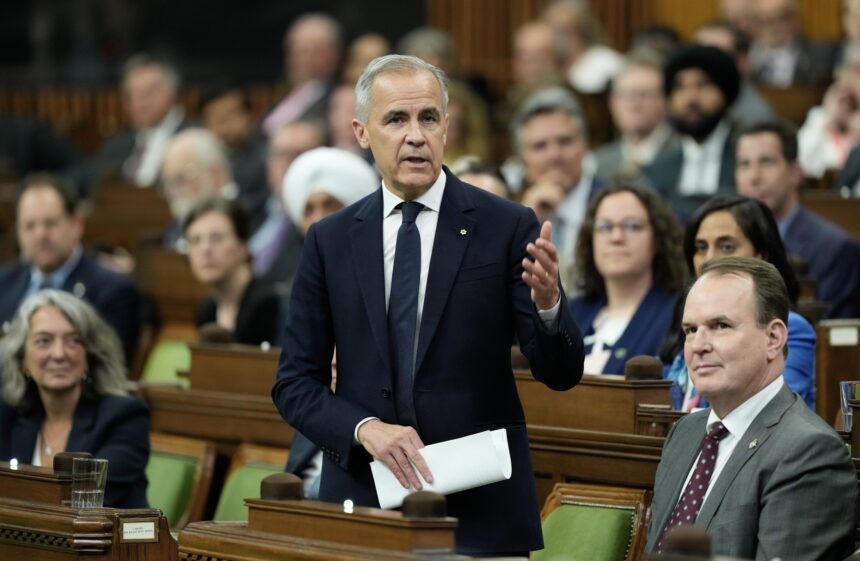In a high-stakes diplomatic gambit that has left Canadian industries on edge, Prime Minister Mark Carney engaged in preliminary discussions with U.S. President Donald Trump’s transition team this week, while Ottawa maintains a conspicuous silence on potential retaliatory measures against threatened American tariffs.
The discussions, which sources describe as “exploratory but tense,” mark Carney’s first major international challenge since taking office. The former Bank of England governor, whose economic credentials were central to his electoral appeal, now faces the daunting task of preventing a trade war that could devastate key Canadian export sectors.
“We’re approaching these conversations with clear eyes about protecting Canadian interests,” Carney told reporters briefly after emerging from a closed-door session at the Canadian Embassy in Washington. “But make no mistake – Canada won’t be used as a bargaining chip in America’s broader trade strategy.”
Trump’s transition team has repeatedly signaled intentions to implement sweeping tariffs as high as 20% on Canadian goods, particularly targeting automotive parts, lumber, and agricultural products. The threats have already triggered market volatility, with the Canadian dollar experiencing its sharpest weekly decline in 14 months.
Industry leaders across Canada are growing increasingly concerned about the federal government’s apparent reluctance to outline specific retaliatory measures. “Every day without a clear counter-strategy costs us millions in investment uncertainty,” said Maria Fernandez, head of the Canadian Manufacturing Coalition, in an exclusive interview with CO24. “Our American counterparts already have contingency plans – we need to know ours.”
Economic analysts from Canada’s major financial institutions have projected potential losses exceeding $32 billion annually if the full scope of Trump’s proposed tariffs materializes. The automotive sector, already navigating complex supply chain challenges, could face catastrophic disruption in southern Ontario manufacturing hubs.
Behind the scenes, sources within Global Affairs Canada confirm that specialized trade teams have prepared detailed response options, including targeted counter-tariffs on American imports that would strategically impact politically sensitive regions in the United States. These measures remain sealed within ministerial briefing books, however, as the Carney government pursues diplomatic solutions.
“Playing our retaliatory hand too early would be a critical strategic error,” explained former Canadian ambassador to the United States David McNaughton. “Carney understands the delicate choreography of international negotiations – sometimes what you don’t say publicly carries more weight than what you do.”
The stakes extend far beyond immediate economic impacts. The North American integrated supply chain, carefully cultivated since the original free trade agreement in 1988, faces unprecedented fragmentation. Canadian businesses have invested billions in cross-border operations that rely on predictable tariff structures.
Deputy Prime Minister Chrystia Freeland, who spearheaded Canada’s USMCA negotiations during the previous Trump administration, has joined Carney’s negotiating team, bringing valuable institutional knowledge of Trump’s negotiating patterns. “We’ve successfully navigated these waters before,” Freeland noted, “and we’ll defend Canadian interests with the same determination.”
Business leaders in economic sectors potentially targeted by Trump’s tariffs have urged cohesion across Canada’s political spectrum. Conservative opposition leader Pierre Poilievre has pledged conditional support for Carney’s approach, though he criticized the government for not developing contingency plans earlier.
“This isn’t about partisan politics – it’s about protecting Canadian jobs and economic sovereignty,” Poilievre stated during Question Period. “The government will have our support in standing firm against these tariff threats, but Canadians deserve transparency about our response strategy.”
As negotiations continue behind closed doors, the fundamental question remains: Will Canada’s economic relationship with its largest trading partner survive the renewed pressure of America’s protectionist turn, or are we witnessing the beginning of a profound decoupling that will reshape North American commerce for decades to come?
























